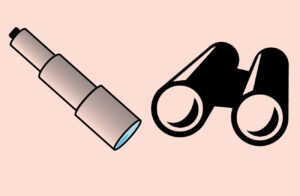Disclosure: As an Amazon Associate I earn from qualifying purchases.
Binoculars and monocular are two of our favorite devices for natural adventure lovers. Their design seems like siblings but there are some major differences between them in features and performance. At the same time, the selection depends on your purposes, and preferences of you. We have got so many queries about which are better binoculars vs monocular? This time we are going to answer this question in this article. Keep reading this article to get the point of view that will better suit you between binoculars and monocular. Before moving to the comparison, let’s have a look at exactly what is binoculars and monocular.
What are Binoculars?
Binoculars are handheld optical instruments that can magnify distant objects. The name “Binoculars” is derived from Greek. The meaning of “Bi” is “two” and “Oculus” means “eye”. The binoculars are designed with two particular telescopes for both eyes mountaineering on a single frame. Moreover, the characteristics of binoculars are mainly described by using two primary parameters. You can see 2 numbers on the binoculars’ specifications like 7×35, 10×42, 12×50, and so on.
The first value is the magnification power. And 2nd value is the diameter of the objective lens. For example, a 10×42 binocular can magnify a distant object 10 times larger. It can gather enough light through the 42mm objective lens. After that, the binocular has a focusing system to adjust the focus of both telescopes simultaneously. You can adjust the focus using a center wheel knob.
The prism attachment of binoculars provides the facility to upright an inverted image. Binoculars are also great for bird watching, as you can get a good view of the bird from a distance. They are a great tool for nature enthusiasts, as they allow you to see things you would not be able to see with the naked eye. Moreover, they are also great for sporting events, as you can see the action from a better vantage point.
What is a Monocular?
Monocular is another optical instrument like binoculars. This is also compact and lightweight. The word Monocular comes from Greek also. The “Monos” defines the meaning “one” and “Oculus” means “eye”. Monocular is optical device that allows the viewing of objects located at a distance. They are very similar to binoculars but have only one barrel. This barrel houses the lens that gathers and focuses the light from the object being viewed.
Eventually, monocular is very popular among birdwatchers and hunters because they provide a clear, magnified view of the object without having to lug around a large and heavy binocular. The monocular is typically designed to provide a clear, undistorted image, making it perfect for viewing distant objects with one eye only. It comes with one telescope attachment though it’s small and has permit limits. So far, monocular is used widely as rangefinders in the military, hunting, or golf.
Which are better: binoculars vs monocular?
There are so many similarities between binoculars and monocular, that some users think monocular is a one-eyed version of binoculars. But several differences exist in their design, features, functionalities, and applications.
Magnification power & Aperture
The magnification power system is the same for both binoculars and monocular as they are used in similar types of applications. The magnification power varies according to the specifications. And, The magnification range can be 4x to 12x or more for binoculars. For monocular, the range is typically 5x to 10x. Both come balancing with the size of the objective lens. The objective lens size defines the amount of light captured by the device. The clearness and sharpness depend on the size of the objective lens. The size can be 35mm, 40mm, 42mm, 50mm, and so on. The more diameter ensures more light gathering and renders crystal clear output.
Field of View
The field of view is interrelated with the magnification power of the binoculars and monocular both. In this case, binoculars provide a wider field of view. It is even said that the worst binoculars provide a better field of view than the best monocular. As you can see twin tubes that allow you to cover a larger vision at a time. So, for scouting, scanning, and watching active events, binoculars are the right choice.
The monocular provide the field of view like a telescope and this is known as the “true field of view”. For monocular, less field of view is preferable to spot the precision targets whereas more field of view is recommended for several events if you choose a pair of binoculars. But the monocular provides a particular edge view in low light conditions or night vision situations.
Though using one eye in night vision is not comfortable. Rather you can use a night vision binocular instead. But the fact is, using both eyes in night vision can reduce the adjustment ability in low light conditions. For this reason, monocular is used for many purposes like military personnel and the special forces. That helps to adjust your eyes with natural night vision easily.
Lens and Prism
Binoculars are designed using 3 prism systems roof prism, porro prism, and galilean. Though the modern binos are developed by roof and Porro prism. The lenses of both binoculars and monocular can collect the lights from the objects and then amplify them. The prisms are the most expensive parts of the binoculars and monocular. The roof prism provides high resolution and clear images and makes the device lightweight. On the other hand, Porro prisms have a zig-zag mechanism. So it can provide better image quality but make the device bulkier. Binoculars need 2 prisms whereas monoculars have only one set of prisms. It will be cheaper as well as compact too.
Viewing Comfort
For binoculars, you need to use 2 eyes at a time to observe distant objects. Where the monocular requires one eye. If you look through any of the devices for a long period, that may cause eye fatigue. At this point, binoculars work better than monocular as your both eyes look through the same objects.
Binoculars vs Monocular: Where to use?
With the differences in design, features, and performances, the purposes are also varied for the binoculars and monocular. For example –
Birding
For birding, you should go for binoculars. Because the activities of birds are so frequent and you need to hold them for a long time sometimes. If you choose a monocular, it will be hard to hold the device for a longer period without eye fatigue. Considering all things, binoculars work well for birding. If you like short-period birding and something lightweight, then monocular can be your partner in birding too.
Hiking
To enjoy hiking, a binocular is a better option than a monocular. Though binoculars are more lightweight. And if you use it frequently, then you can go for monocular. But for covering more areas at a time with a detailed view and viewing comfort, binoculars can be the best companion during hiking.
Night vision
For night vision, many of us prefer monocular. As you can view using one eye, the other eye helps to adjust to the low light condition. All types of binoculars don’t have night vision mode. If you prefer a binocular for enjoying night view or hunting, you should choose which has ED properties to cut the chromatic aberration and color fringing.
Here we have listed the activities according to the performance and suitability of the binoculars and monocular in the table depicted below:
| When to use Binoculars | When to use Monocular |
| Scouting and tracking | Hiking |
| Sporting events | Golf |
| Marine sightseeing | Night vision |
| Stationary hunting | Spotting for long-distance rifles |
| Equestrian activities | Bird watching |
The benefits of binoculars over monocular
Some of the benefits of binoculars over monoculars are as follows-
- Binoculars provide a wider field of view.
- Binoculars are more stable than monocular, which can be easily bumped or swayed.
- Binoculars provide a three-dimensional view, while monocular only provide a two-dimensional view.
- Binoculars are more effective in low-light conditions than monocular.
- Binoculars are more expensive than monocular but offer a better viewing experience.
Limitations of Binoculars
- Binoculars are bulky and can be heavy to carry around.
Benefits of monocular over a binocular
There are many benefits to using a monocular over a binocular. Some of these benefits include:
- Monocular is typically smaller and lighter than binoculars, making them easier to carry around.
- Suitable for perfect night vision
- Monocular is relatively inexpensive compared to binoculars.
Limitations of Monocular
- If one eye is weaker than the other, so it can be difficult to judge distances.
- Can only see one thing at a time.
Final Thoughts
The key difference between binoculars and monocular is that binoculars provide stereo vision, while monocular provide only one image. This means that binoculars can give you a more accurate sense of depth and distance, making them better for activities like bird watching or hunting. Monocular is cheaper and lighter than binoculars, making them a good choice for activities like hiking or backpacking.
There is no definitive answer to this question as it depends on individual preferences and needs. Some people find binoculars more comfortable to use, while others find monocular more compact and easy to carry around. Ultimately, it is up to the individual to decide which is better for them.



